2023届高三英语二轮复习虚拟语气课件(共31张PPT)
文档属性
| 名称 | 2023届高三英语二轮复习虚拟语气课件(共31张PPT) |  | |
| 格式 | zip | ||
| 文件大小 | 440.4KB | ||
| 资源类型 | 教案 | ||
| 版本资源 | 通用版 | ||
| 科目 | 英语 | ||
| 更新时间 | 2023-02-15 14:13:13 | ||
图片预览

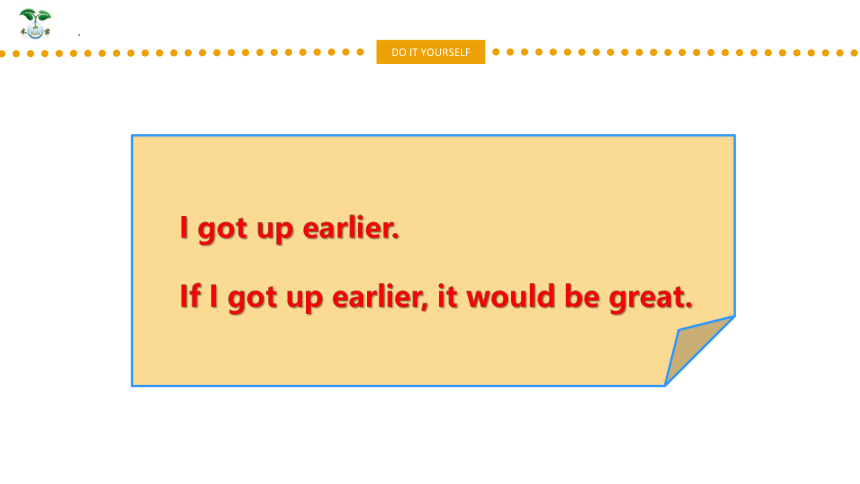
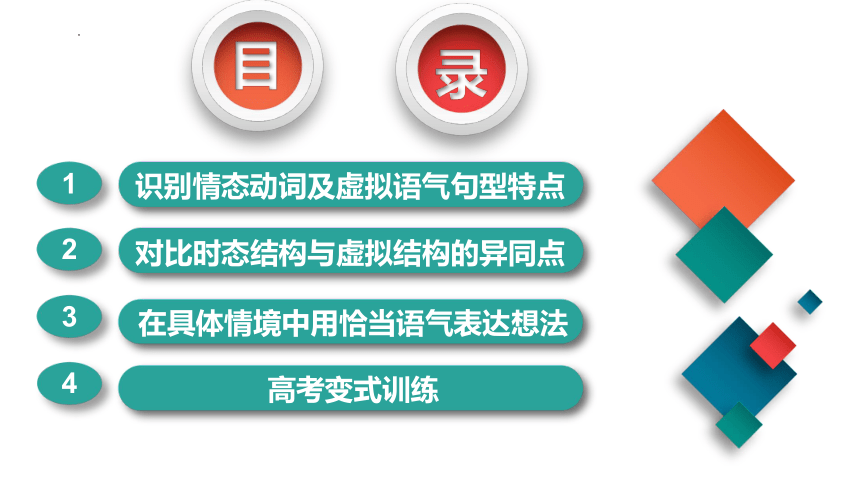
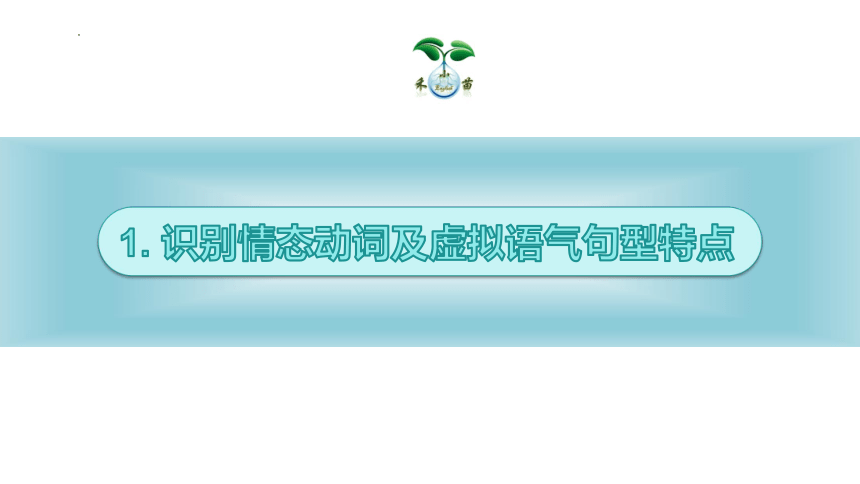
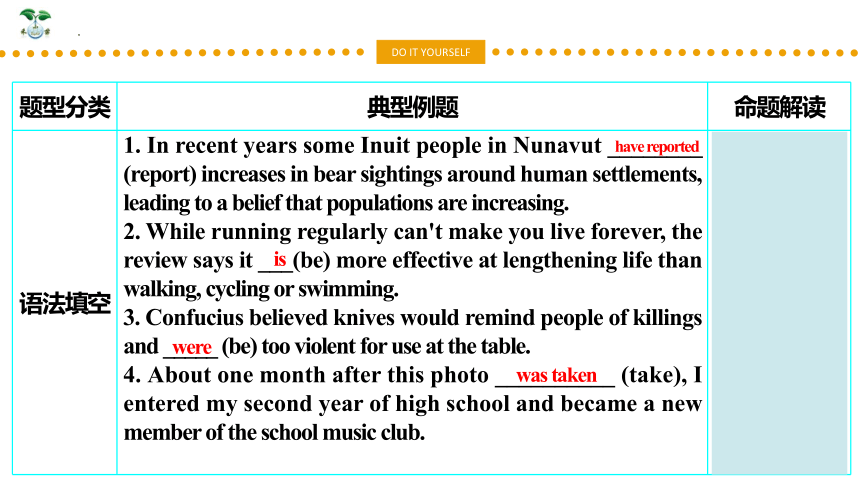
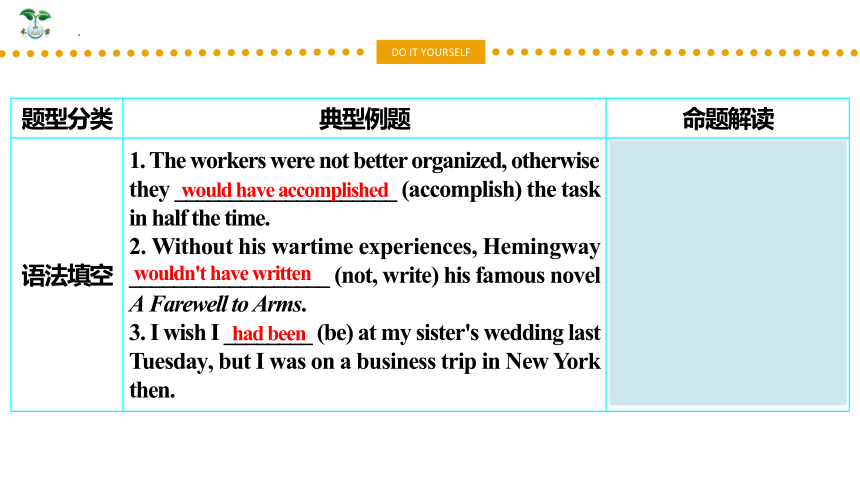
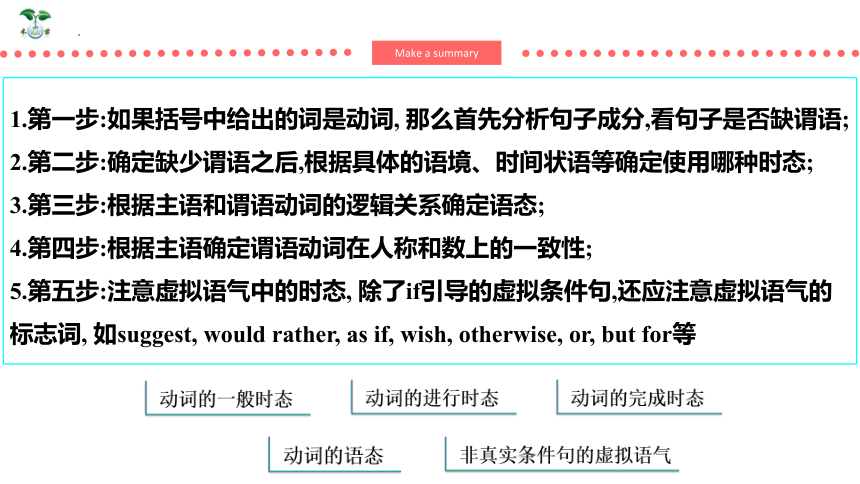

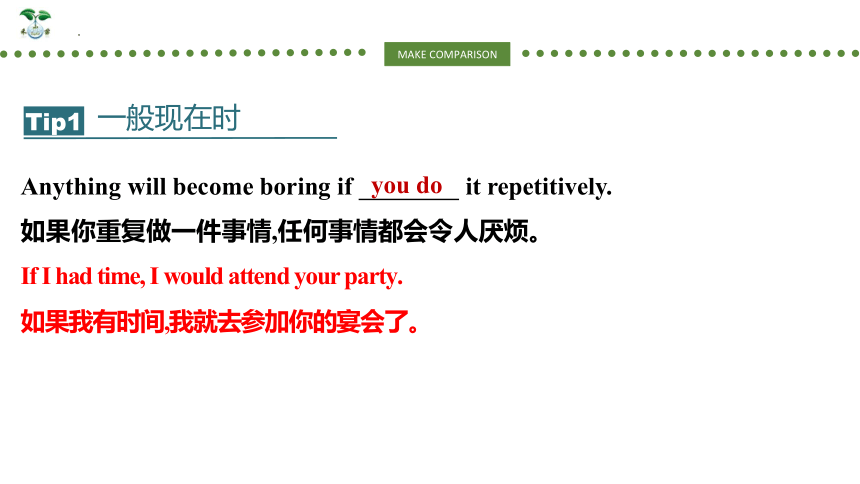
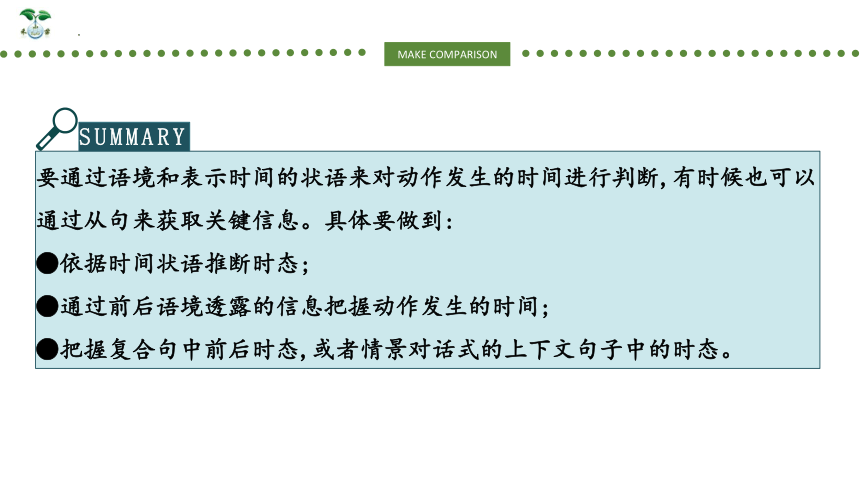

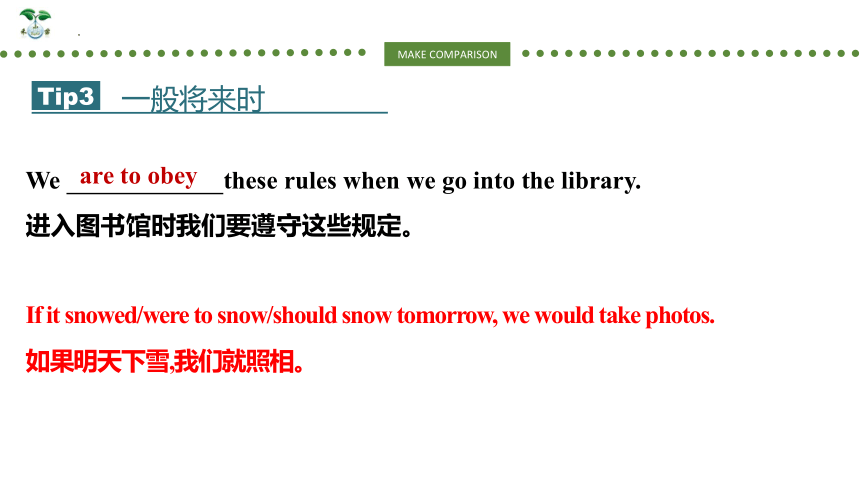
文档简介
(共31张PPT)
我要是早点起床就好了
I got up earlier.
If I got up earlier, it would be great.
目
录
1
识别情态动词及虚拟语气句型特点
2
3
对比时态结构与虚拟结构的异同点
在具体情境中用恰当语气表达想法
4
高考变式训练
1. 识别情态动词及虚拟语气句型特点
题型分类 典型例题 命题解读
语法填空 1. In recent years some Inuit people in Nunavut ________ (report) increases in bear sightings around human settlements, leading to a belief that populations are increasing. 2. While running regularly can't make you live forever, the review says it ___(be) more effective at lengthening life than walking, cycling or swimming. 3. Confucius believed knives would remind people of killings and _____ (be) too violent for use at the table. 4. About one month after this photo __________ (take), I entered my second year of high school and became a new member of the school music club. 1.时态的形式
2.时态的意义
3.语态的形式
4.语态的意义
5.人称的形式
6.人称的意义
have reported
is
were
was taken
题型分类 典型例题 命题解读
语法填空 1. The workers were not better organized, otherwise they ____________________ (accomplish) the task in half the time. 2. Without his wartime experiences, Hemingway __________________ (not, write) his famous novel A Farewell to Arms. 3. I wish I ________ (be) at my sister's wedding last Tuesday, but I was on a business trip in New York then. 1. 非真实语气
2. 虚拟句形式
with, without, but for, or, wish, as if/as though
3. 虚拟句结构
wouldn't have written
would have accomplished
had been
1.第一步:如果括号中给出的词是动词, 那么首先分析句子成分,看句子是否缺谓语;
2.第二步:确定缺少谓语之后,根据具体的语境、时间状语等确定使用哪种时态;
3.第三步:根据主语和谓语动词的逻辑关系确定语态;
4.第四步:根据主语确定谓语动词在人称和数上的一致性;
5.第五步:注意虚拟语气中的时态, 除了if引导的虚拟条件句,还应注意虚拟语气的标志词, 如suggest, would rather, as if, wish, otherwise, or, but for等
2. 对比时态结构与虚拟结构的异同点
一般现在时
Tip1
Anything will become boring if it repetitively.
如果你重复做一件事情,任何事情都会令人厌烦。
If I had time, I would attend your party.
如果我有时间,我就去参加你的宴会了。
you do
SUMMARY
要通过语境和表示时间的状语来对动作发生的时间进行判断,有时候也可以通过从句来获取关键信息。具体要做到:
●依据时间状语推断时态;
●通过前后语境透露的信息把握动作发生的时间;
●把握复合句中前后时态,或者情景对话式的上下文句子中的时态。
一般过去时
Tip2
He said he would not go if it .
他说过如果下雨,他不会去的。
You didn’t let me drive. If we had driven in turn, you wouldn’t have got so tired.
你当时不让我开车。如果我们轮流开,你就不会觉得那么累了。
在虚拟条件状语从句中可省略if,把were, had, should提到句首,变为倒装句式。
Had we driven in turn, you wouldn’t have got so tired.
rained
一般将来时
Tip3
We these rules when we go into the library.
进入图书馆时我们要遵守这些规定。
If it snowed/were to snow/should snow tomorrow, we would take photos.
如果明天下雪,我们就照相。
are to obey
If you the wrong name in an email, it is best to apologise in a serious manner. 你如果在电子邮件中写错了名字,最好以严肃的方式道歉。
have written
If you had worked hard, you would be sitting comfortably in an office now.
如果你努力工作了,你现在就会舒服地坐在办公室里。(从句与过去事实相反,主句与现在事实相反)
完成时
Tip4
过去将来时
Tip5
He said that he for us at the station.
他说他将在车站等我们。
would wait
I wish (that) I would fly freely in the sky.
我希望在天空自由飞翔。
FEEDBACK
if条件句
Tip1
情况 从句的谓语动词 主句的谓语动词
与现在事实相反 动词的过去式(be动词一律用were) would/could/should/might+动词原形
与过去事实相反 had+过去分词 would/could/should/might+have+过去分词
与将来事实相反 动词的过去式;should+动词原形; were to+动词原形 would/could/might/should+动词原形
If I had time, I would attend your party.
如果我有时间,我就去参加你的宴会了。
You didn’t let me drive. If we had driven in turn, you wouldn’t have got so tired.
你当时不让我开车。如果我们轮流开,你就不会觉得那么累了。
If it snowed/were to snow/should snow tomorrow, we would take photos.
如果明天下雪,我们就照相。
错综时间条件句
Tip2
If you had worked hard, you would be sitting comfortably in an office now.
如果你努力工作了,你现在就会舒服地坐在办公室里。(从句与过去事实相反,主句与现在事实相反)
有时主句和虚拟条件从句的动作发生的时间不一致,此时,主句和从句的谓语动词要根据各自所指的不同时间选择适当的动词形式。
如果没有电,今天的生活就会完全不同。
If there were no electricity, life would be quite different today.
Without electricity (=If there were no electricity), life would be quite different today.
有时虚拟条件并不通过条件从句表达出来,而是通过词、短语(常见的有without、but for、in case、for fear that、otherwise、supposing等)或上下文来暗示,此时句子的时态要依具体情况而定。
要不是你的帮助,那将会造成巨大的损失。
But for your help, it would have caused a serious loss.
含蓄条件句
Tip3
Look at the trouble we're in. If only we had taken our teacher's advice!
看看我们所处的困境,要是我们接受老师的建议就好了。
if only后面的谓语动词常用一般过去时(对现在虚拟)、过去完成时(对过去虚拟)与过去将来时(对将来虚拟),表示强烈的愿望
He suggests that our school should provide more books about popular science.
他建议我们学校提供一些关于流行科学的书籍。
表示坚持、建议、命令和要求的动词( advise, insist, order, suggest, command, demand, propose, require )后的宾语从句中,谓语形式常采用“(should+)动词原形” 。
注意:
(1)动词insist如果表示“坚持说”,宾语从句不用虚拟语气。
suggest作“表明,暗示”讲时,其后的宾语从句也不用虚拟语气。
George is going to talk about the geography of his country, but I'd rather he focused more on its culture.
乔治将要谈论关于他的国家的地理情况,但是我宁愿他更多地谈它的文化(方面的情况)。
would rather后的宾语从句一般用虚拟语气,表愿望,意为“宁愿,但愿”。
It is strange that he (should) react in this way.
很奇怪,他竟然作出这样的反应。
在“It is necessary/important/strange/suggested/demanded/ordered/ requested+that从句”中,谓语动词用should+动词原形,should可以省略。
It is (high) time that you went/should go to school.
你该去上学了。
It is (high/about) time (that)...句型中,定语从句的谓语动词用过去式,或用should+动词原形(其中should通常不省略)。此句型意为“(现在)该……”,用来表示提议。
He stood up and offered her his seat, as if he had read her mind.
他站起来给她让座,他好像读懂了她的心思。
as if/as though引导的表语从句和方式状语从句中常用虚拟语气
注意:如果表示的事情可能会发生,那么从句中的谓语动词可用陈述语气。
It looks as if it is going to rain.
天看上去似乎要下雨。
3. 在具体情境中用恰当语气表达想法
What a pity! You missed the sightseeing, or we ______________(have)a good time together.
They are trying to make sure that 5G terminals _________________ (install) by 2022 for the Beijing Winer Olympics.
根据语境可知,此处是虚拟语气,表示对过去事实的假设。谓语动词应用 would/ should/ could have done。
由时间状语by 2022可知,此处表示在将来某一时间以前已经完成或一直持续的动作,应用将来完成时;5G terminals与install之间是动宾关系,故应用被动语态。
will have been installed
would have had
If we _________(catch) the flight yesterday, we would be enjoying our holiday on the beach now.
这是一个含错综时间的虚拟条件句,主句的时间状语为now,表示与现在事实相反的虚拟,条件句的时间状语为yesterday,表示与过去事实相反的虚拟,故条件句时态要用过去完成时。
had caught
The old man wished he ___________________ (live) to see the birth of his grandchild.
—Did Jack take the doctor's advice that he ______ lie in bed for another three days
—If only he ______ .
I got a C for my report. You ______ have made it wrong. You know I have put much time and energy to the report.
But for those interruptions, the meeting _______ have finished half an hour ago.
would/could/might live
should
had
must
would
Susan: Larry, how soon shall we arrive in Toronto
Larry: If we don't make any more stops, we 1 be there by nightfall.
Susan: What By nightfall I am starving to death. 2 we stop and find something to eat
Larry: Actually, we have a free dinner waiting for us at the hotel in Toronto.
Susan: I know, but I 3 stand the hunger any more.
Larry: You know me, Susan. I don't like to spend money. Sorry.
Susan: Yeah, you are really cheap! If you 4 so cheap, we 5 (fly) to Thailand for our vacation instead of driving to Toronto.
Larry: Thailand Don't be ridiculous! Even if I weren't cheap, you know we 6 afford to go that far away for vacation!
Susan: Well, you 7 afford a stop for food, right
Larry: If we do, we 8 waste time, gas, and money. I think we 9 just wait until we get to Toronto. Oh, hey, I remember you are fond of candy. I think I 10 have some of that candy you like in my backpack.
Susan: Candy Great!
should
Can
can't
weren't
would be flying
couldn't
can
will
should
might
1.情态动词主要掌握以下几点:
(1)各种常见情态动词的基本用法及其特殊情况;
(2)情态动词表推测。在学习过程中,主要是体会语境,理解其表达的情感态度,结合用法做出正确判断。
2.虚拟语气,首要掌握的是if条件从句引出的虚拟语气,在这基础上,掌握其他从句中的语气和固定句式,并在解题时,始终把握好时间线索以求做出正确答案。
因此,情态动词和虚拟语气的学习关键是:“语境”和“时间”的把握。
我要是早点起床就好了。
他建议……
我宁愿……
我竟然……
如果我早点起床,我就……
____________________________________________________________________
THANKS
我要是早点起床就好了
I got up earlier.
If I got up earlier, it would be great.
目
录
1
识别情态动词及虚拟语气句型特点
2
3
对比时态结构与虚拟结构的异同点
在具体情境中用恰当语气表达想法
4
高考变式训练
1. 识别情态动词及虚拟语气句型特点
题型分类 典型例题 命题解读
语法填空 1. In recent years some Inuit people in Nunavut ________ (report) increases in bear sightings around human settlements, leading to a belief that populations are increasing. 2. While running regularly can't make you live forever, the review says it ___(be) more effective at lengthening life than walking, cycling or swimming. 3. Confucius believed knives would remind people of killings and _____ (be) too violent for use at the table. 4. About one month after this photo __________ (take), I entered my second year of high school and became a new member of the school music club. 1.时态的形式
2.时态的意义
3.语态的形式
4.语态的意义
5.人称的形式
6.人称的意义
have reported
is
were
was taken
题型分类 典型例题 命题解读
语法填空 1. The workers were not better organized, otherwise they ____________________ (accomplish) the task in half the time. 2. Without his wartime experiences, Hemingway __________________ (not, write) his famous novel A Farewell to Arms. 3. I wish I ________ (be) at my sister's wedding last Tuesday, but I was on a business trip in New York then. 1. 非真实语气
2. 虚拟句形式
with, without, but for, or, wish, as if/as though
3. 虚拟句结构
wouldn't have written
would have accomplished
had been
1.第一步:如果括号中给出的词是动词, 那么首先分析句子成分,看句子是否缺谓语;
2.第二步:确定缺少谓语之后,根据具体的语境、时间状语等确定使用哪种时态;
3.第三步:根据主语和谓语动词的逻辑关系确定语态;
4.第四步:根据主语确定谓语动词在人称和数上的一致性;
5.第五步:注意虚拟语气中的时态, 除了if引导的虚拟条件句,还应注意虚拟语气的标志词, 如suggest, would rather, as if, wish, otherwise, or, but for等
2. 对比时态结构与虚拟结构的异同点
一般现在时
Tip1
Anything will become boring if it repetitively.
如果你重复做一件事情,任何事情都会令人厌烦。
If I had time, I would attend your party.
如果我有时间,我就去参加你的宴会了。
you do
SUMMARY
要通过语境和表示时间的状语来对动作发生的时间进行判断,有时候也可以通过从句来获取关键信息。具体要做到:
●依据时间状语推断时态;
●通过前后语境透露的信息把握动作发生的时间;
●把握复合句中前后时态,或者情景对话式的上下文句子中的时态。
一般过去时
Tip2
He said he would not go if it .
他说过如果下雨,他不会去的。
You didn’t let me drive. If we had driven in turn, you wouldn’t have got so tired.
你当时不让我开车。如果我们轮流开,你就不会觉得那么累了。
在虚拟条件状语从句中可省略if,把were, had, should提到句首,变为倒装句式。
Had we driven in turn, you wouldn’t have got so tired.
rained
一般将来时
Tip3
We these rules when we go into the library.
进入图书馆时我们要遵守这些规定。
If it snowed/were to snow/should snow tomorrow, we would take photos.
如果明天下雪,我们就照相。
are to obey
If you the wrong name in an email, it is best to apologise in a serious manner. 你如果在电子邮件中写错了名字,最好以严肃的方式道歉。
have written
If you had worked hard, you would be sitting comfortably in an office now.
如果你努力工作了,你现在就会舒服地坐在办公室里。(从句与过去事实相反,主句与现在事实相反)
完成时
Tip4
过去将来时
Tip5
He said that he for us at the station.
他说他将在车站等我们。
would wait
I wish (that) I would fly freely in the sky.
我希望在天空自由飞翔。
FEEDBACK
if条件句
Tip1
情况 从句的谓语动词 主句的谓语动词
与现在事实相反 动词的过去式(be动词一律用were) would/could/should/might+动词原形
与过去事实相反 had+过去分词 would/could/should/might+have+过去分词
与将来事实相反 动词的过去式;should+动词原形; were to+动词原形 would/could/might/should+动词原形
If I had time, I would attend your party.
如果我有时间,我就去参加你的宴会了。
You didn’t let me drive. If we had driven in turn, you wouldn’t have got so tired.
你当时不让我开车。如果我们轮流开,你就不会觉得那么累了。
If it snowed/were to snow/should snow tomorrow, we would take photos.
如果明天下雪,我们就照相。
错综时间条件句
Tip2
If you had worked hard, you would be sitting comfortably in an office now.
如果你努力工作了,你现在就会舒服地坐在办公室里。(从句与过去事实相反,主句与现在事实相反)
有时主句和虚拟条件从句的动作发生的时间不一致,此时,主句和从句的谓语动词要根据各自所指的不同时间选择适当的动词形式。
如果没有电,今天的生活就会完全不同。
If there were no electricity, life would be quite different today.
Without electricity (=If there were no electricity), life would be quite different today.
有时虚拟条件并不通过条件从句表达出来,而是通过词、短语(常见的有without、but for、in case、for fear that、otherwise、supposing等)或上下文来暗示,此时句子的时态要依具体情况而定。
要不是你的帮助,那将会造成巨大的损失。
But for your help, it would have caused a serious loss.
含蓄条件句
Tip3
Look at the trouble we're in. If only we had taken our teacher's advice!
看看我们所处的困境,要是我们接受老师的建议就好了。
if only后面的谓语动词常用一般过去时(对现在虚拟)、过去完成时(对过去虚拟)与过去将来时(对将来虚拟),表示强烈的愿望
He suggests that our school should provide more books about popular science.
他建议我们学校提供一些关于流行科学的书籍。
表示坚持、建议、命令和要求的动词( advise, insist, order, suggest, command, demand, propose, require )后的宾语从句中,谓语形式常采用“(should+)动词原形” 。
注意:
(1)动词insist如果表示“坚持说”,宾语从句不用虚拟语气。
suggest作“表明,暗示”讲时,其后的宾语从句也不用虚拟语气。
George is going to talk about the geography of his country, but I'd rather he focused more on its culture.
乔治将要谈论关于他的国家的地理情况,但是我宁愿他更多地谈它的文化(方面的情况)。
would rather后的宾语从句一般用虚拟语气,表愿望,意为“宁愿,但愿”。
It is strange that he (should) react in this way.
很奇怪,他竟然作出这样的反应。
在“It is necessary/important/strange/suggested/demanded/ordered/ requested+that从句”中,谓语动词用should+动词原形,should可以省略。
It is (high) time that you went/should go to school.
你该去上学了。
It is (high/about) time (that)...句型中,定语从句的谓语动词用过去式,或用should+动词原形(其中should通常不省略)。此句型意为“(现在)该……”,用来表示提议。
He stood up and offered her his seat, as if he had read her mind.
他站起来给她让座,他好像读懂了她的心思。
as if/as though引导的表语从句和方式状语从句中常用虚拟语气
注意:如果表示的事情可能会发生,那么从句中的谓语动词可用陈述语气。
It looks as if it is going to rain.
天看上去似乎要下雨。
3. 在具体情境中用恰当语气表达想法
What a pity! You missed the sightseeing, or we ______________(have)a good time together.
They are trying to make sure that 5G terminals _________________ (install) by 2022 for the Beijing Winer Olympics.
根据语境可知,此处是虚拟语气,表示对过去事实的假设。谓语动词应用 would/ should/ could have done。
由时间状语by 2022可知,此处表示在将来某一时间以前已经完成或一直持续的动作,应用将来完成时;5G terminals与install之间是动宾关系,故应用被动语态。
will have been installed
would have had
If we _________(catch) the flight yesterday, we would be enjoying our holiday on the beach now.
这是一个含错综时间的虚拟条件句,主句的时间状语为now,表示与现在事实相反的虚拟,条件句的时间状语为yesterday,表示与过去事实相反的虚拟,故条件句时态要用过去完成时。
had caught
The old man wished he ___________________ (live) to see the birth of his grandchild.
—Did Jack take the doctor's advice that he ______ lie in bed for another three days
—If only he ______ .
I got a C for my report. You ______ have made it wrong. You know I have put much time and energy to the report.
But for those interruptions, the meeting _______ have finished half an hour ago.
would/could/might live
should
had
must
would
Susan: Larry, how soon shall we arrive in Toronto
Larry: If we don't make any more stops, we 1 be there by nightfall.
Susan: What By nightfall I am starving to death. 2 we stop and find something to eat
Larry: Actually, we have a free dinner waiting for us at the hotel in Toronto.
Susan: I know, but I 3 stand the hunger any more.
Larry: You know me, Susan. I don't like to spend money. Sorry.
Susan: Yeah, you are really cheap! If you 4 so cheap, we 5 (fly) to Thailand for our vacation instead of driving to Toronto.
Larry: Thailand Don't be ridiculous! Even if I weren't cheap, you know we 6 afford to go that far away for vacation!
Susan: Well, you 7 afford a stop for food, right
Larry: If we do, we 8 waste time, gas, and money. I think we 9 just wait until we get to Toronto. Oh, hey, I remember you are fond of candy. I think I 10 have some of that candy you like in my backpack.
Susan: Candy Great!
should
Can
can't
weren't
would be flying
couldn't
can
will
should
might
1.情态动词主要掌握以下几点:
(1)各种常见情态动词的基本用法及其特殊情况;
(2)情态动词表推测。在学习过程中,主要是体会语境,理解其表达的情感态度,结合用法做出正确判断。
2.虚拟语气,首要掌握的是if条件从句引出的虚拟语气,在这基础上,掌握其他从句中的语气和固定句式,并在解题时,始终把握好时间线索以求做出正确答案。
因此,情态动词和虚拟语气的学习关键是:“语境”和“时间”的把握。
我要是早点起床就好了。
他建议……
我宁愿……
我竟然……
如果我早点起床,我就……
____________________________________________________________________
THANKS
